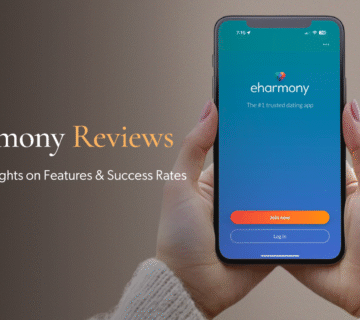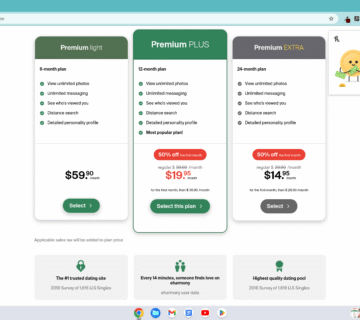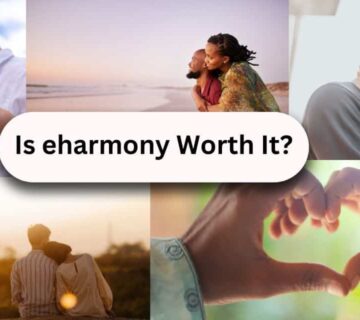Choosing the right dating site can make all the difference in your search for love. In 2025, the debate between eHarmony and Match.com remains one of the hottest topics for singles seeking serious relationships or exploring online dating for the first time.
Introduction: Why the eHarmony vs Match.com Debate Matters
Match.com and eHarmony are two titans in the online dating industry. With millions of success stories, deep user bases, and a focus on meaningful connections, they attract singles who are ready for something real. But which one is best for you—and why?
The answer depends on your dating goals, personality, and expectations. Some users seek depth and scientific matchmaking, others want control and flexibility. Let’s break down the pros, cons, and stats to help you choose.
User Base & Demographics
| Feature | Match.com | eHarmony |
|---|---|---|
| Total members | 75 million+ | 45 million+ |
| Monthly logins | 30 million+ | 16 million+ |
| Largest age group | 30–49, with a strong 50+ base | 30–50 |
| Relationship focus | All types (casual to serious) | Primarily long-term/marriage |
| Diversity | More LGBTQ+ inclusive | Mainly straight users; less LGBTQ+ |
-
Match.com offers a wide net and is versatile for casual dating, serious relationships, or even marriage. The user base is slightly more diverse in age, gender, life stage, and orientation.
-
eHarmony is known for attracting serious daters, primarily heterosexual singles, and focuses intensively on compatibility for long-term partnership.
Matchmaking & Features
eHarmony: Science-Based Compatibility
-
32 Dimensions® Personality Test: You’ll fill out a lengthy, psychology-backed questionnaire, and matches are strictly based on your compatibility.
-
Guided, curated matches: You can’t browse everyone—only those the system suggests.
-
Ideal for: Singles craving structure, decisive matches, and a proven compatibility process—the kind of person who values science and guidance in relationships.
Match.com: Flexible Search and Control
-
Manual Browsing: Search for members using advanced filters (interest, location, lifestyle, and more).
-
Daily Matches & Reverse Match: Offers algorithm picks and lets you see who’s looking for someone like you.
-
Open Communication: Larger pool to browse, message, and make real-time choices.
-
Ideal for: Singles seeking more independence, diverse relationship types, or who like to control their search experience.
Pricing & Value
| Platform | Lowest Monthly Cost (Annual Plan) | Shortest Commitment | Value for Features |
|---|---|---|---|
| Match.com | ~$18.99–$21.99 | 1 month | High flexibility |
| eHarmony | ~$25.90–$35.90+ | 6 months | More for deep matching |
-
Match.com is typically more affordable, especially with short-term plans. Its pricing is straightforward, but free communication is limited.
-
eHarmony is pricier, and you’ll need at least a 6-month commitment for premium features. The cost reflects its proprietary matching algorithm and more hands-on experience.
Success Rates & Notable Outcomes
-
eHarmony claims responsibility for 4% of U.S. marriages, with an impressively low divorce rate among couples who met on the platform.
-
Match.com has facilitated millions of dates and has a high number of lasting relationships and marriages. Its longer history in the dating game gives it plenty of positive outcomes and stories.
-
Both platforms show high engagement, but eHarmony users are generally reported to be more relationship-focused, while Match offers a bigger active user pool for all intents.
User Experience & Interface
-
eHarmony: Structured, a bit more time-consuming due to quizzes, less browsing freedom.
-
Match.com: Intuitive, modern, faster signup, plenty of advanced filters, and mobile-friendly.
User reviews indicate:
“If you want a questionnaire and structure, eHarmony is for you. If you want more control and a bigger range of choices, Match.com wins.”
“Match is more affordable and has a more modern feel. eHarmony can feel restrictive but is better for deep matches.”
Pros and Cons
| Platform | Top Pros | Common Cons |
|---|---|---|
| Match.com | Flexible; huge user base; cheaper; LGBTQ+ inclusive | Some inactive profiles; less depth in matching |
| eHarmony | Proven compatibility; high success for marriage | Expensive; less browsing freedom; not ideal for LGBTQ+ |
Final Verdict: Which Should You Choose?
-
Opt for eHarmony if:
-
You want a relationship or marriage.
-
You prefer science-based matching and aren’t in a rush.
-
You’re willing to invest time and money for better odds.
-
-
Choose Match.com if:
-
You’re open to different types of connections (from dating to serious).
-
You like browsing and making your own choices.
-
You value a bigger, more diverse pool—and want a better deal on price.
-
Many experts suggest trying both, as your comfort with interface and matchmaking style makes a world of difference.
Stay Safe While Dating Online
Before joining any dating site, learn how to stay safe and avoid common pitfalls. For authoritative, up-to-date online dating safety advice, the Federal Trade Commission has a trusted resource: FTC Online Dating Scams Guide.
Read More: Are There Fake Profiles on Match.com? The 2025 Guide to Spotting & Avoiding Scams
Bottom Line:
Match.com offers the best balance of flexibility, diversity, and value in 2025, making it ideal for singles of all backgrounds and relationship goals. However, eHarmony’s compatibility-focused, science-backed system may be the perfect match if you’re seeking a marriage-minded partner and prefer a hands-on approach. Choose based on your unique dating style—and remember, real, safe love is just a click away!








[…] Read More: eHarmony vs Match.com: Which Is Better in 2025? An In-Depth […]